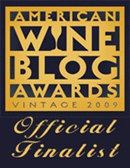Lunch with Jim Laube
|
One of my ongoing tasks is meeting with wine writers. Sometimes it's to introduce a new product, sometimes it's to taste through the line and discuss winemaking styles, or as I've done more recently, it's to tell our story and introduce writers to the new and improved Dry Creek Vineyard. Every now and again, we simply break bread and chat about the state of the industry. These are the most fun as they often result in a fascinating exchange for both of us. Last week I had lunch with Jim Laube from Wine Spectator. We shot the breeze, as they say, on a myriad of topics. Top of my mind was his recent blog post entitled Dry Creek Valley's Wines Should Be Better. We chatted about the Dry Creek Valley dilemma, the rumored possibility of a sale of Chateau Montelena and the use of screw capsor twisties as Jim likes to refer to them. Of particular fascination to me was his opinion on non-vintage vs. vintage wines. It might surprise some of you to learn that Jim believes that consumers might be better served in the long run if the wine industry did away with vintage dated wines in favor of non-vintage winesmuch like they do with Champagne and Port. I was very surprised to hear this especially from someone who quite vocally denounced the 2000 vintage (of course, he was right) and who has legions of followers who anxiously await his annual vintage report. The premise makes some sense. It certainly would eliminate, or at least greatly reduce, quality variation due to vintage. There's the added bonus to winemakers who could blend to their heart's content ever in pursuit of making the highest quality wines possible regardless of what Mother Nature has provided in raw materials. And, then there's the simplicity in packaging. (I could print a 10-year supply if I wanted to!) And, of course, we wouldn't have pundits reporting on the quality of vintages, at least not the way they do now. What a relief that would be. We both agreed that it would probably never happen in our lifetime. But it's an interesting concept and not one that gets discussed much. I'd love to hear your thoughts and welcome your comments. |
8 Comments
Leave a comment
welcome!
This is a blog about what it's really like to be in the wine industry...so sit back, take a sip and enjoy!

about me

our wines

our winery

our events

contact me

privacy statement

favorite posts
A Lifetime in Wine
Top 10 Traits of the Successful Family Winery
The Dreaded Family Meeting
Board Meeting Jitters
Is the Future of the Winery in Danger?
The Case of the Overweight Bottle
Wine and Dementia
Wanted: Talented (Normal) Individual for Family Owned Winery
A Sea of Wine
The Heroes of Our Industry
monthly archives
subscribe
Hopes & Dreams
Owning a Coastal Cottage
Sailing for 6 Months
Getting a 100 Point Score

Favorite Haunts
Coast of Maine
Dry Creek General Store
Dry Creek Kitchen
Healdsburg Bar & Grill
Spoonbar
Sonoma Country Antiques
Baci Cafe & Wine Bar
The Farmhouse
Istanbul's Grand Bazaar
Bad Ass Coffee
Bistro Ralph

Bits of Press
Food & Wine Magazine
The Wine News
Wine Enthusiast
Wine Spectator
Press Democrat
Sunset Magazine
Connoisseurs' Guide
Dan Berger's Vintage Experiences
Cruising World Magazine
Oprah Magazine
The Washington Post
Coastal Living Magazine
Wine & Spirits Magazine
People Magazine
SAG Awards Magazine
Forbes Magazine

Favorite Magazines
Coastal Living
Down East
Sunset
Country Living
Quarterly Review of Wines
Wines & Vines
Wine Spectator
Wine Enthusiast
California Grapevine
Connoisseurs' Guide
Practical Winery & Vineyard
WineReviewOnline
Vineyard & Winery Mgmt

Blog Buddy List
Fermentation
Hip Tastes
Pinot Blogger
All The Best
Julia Flynn Siler
Vinography
Winery Web Site Report
The Pour - Eric Asimov
Dr Vino
Steve Heimoff
Start Up Ladies
Good Wine Under $20
Blind Muscat
The Wineroad Blog
Gabe's View
Wine Peeps
Vici Vino
Cellarmistress' Cellar Talk
Uncork Life
WineVine-Imports Blog
The Wine Witch
SOURMASHED

Honorable Mentions
Fermentation
Wilma Hits The World of Blogs
Most Intriguing New Wine Blogs of 2008
Midwest Wine Guy
Winery of the Month
Julia Flynn Siler
Meritage wines - and a fascinating glimpse into family business
Winery Web Site Report
New Winery Blog: Wilma's Wine World
Start Up Ladies
Insider's View of Family Owned Dry Creek Vineyard
The Glue that Keeps the Whole Thing Going
Atlanta Dish
Blog of the Week
Blind Muscat
The Merits of Meritage
Wineries.net
Boston Wine Expo exhibitors, and the reason why winemakers are so darn happy




CLCWine
June 23, 2008 3:59 PM
I absolutely agree with you and Jim on the non-vintage thing. Would certainly help things be consistent year to year. And like Port, maybe we could have vintage wines only when it is a super stellar year, proclaimed by some sort of governing body (maybe Jim could volunteer to take on that responsibility?? Ha!).
And not getting new labels printed every year would be so nice. Such a pain. Would save a TON of $$.
Dale Cruse said:
June 23, 2008 4:51 PM
Fascinating idea. Though I could see the benefit to the consumer, wouldn't that virtually destroy the future of the auction market?
Or is that actually a good thing? lol
Ian Griffith
June 24, 2008 7:04 AM
While the widespread production of non-vintage wines would likely improve consistency, there will still be the need for an indication of the relative age of the wine. From the perspective of freshness or cellar-worthiness the consumer should be able to tell how long a wine has been on the shelf.
As access to vineyard sources improve or disappear the quality of the blended wine could be seen to vary. To describe these differences it is likely critics like Mr. Laube will find ways to differentiate one year's release from another.
JohnLopresti
June 24, 2008 2:08 PM
Vin ordinaire, vino di tavolo, flor sherry, meritage. Ok. But 1982 late harvest zin, or botrysed berry selected cepage, in Dry Creek, wait a minute, I will mull that with some Gravenstein cider and let you know in a day how that market concept might evolve. I have it: it will provide an economy of scale for mid to small size wineries, like the central valley product sans chemicals, still tablewine at a premium price but under $30., and those small outfits who still want the excellent vineyard designated year-specific varietals could continue with the private reserve.
I can see advantages for employment as well, both as a pathway for recent grads of good enology and viticulture programs, as well as from the proprietor's perspective, to have two concepts of winemaking in one house.
Jack said:
June 24, 2008 2:25 PM
Yes, why not eliminate vintage dating? That SO confuses consumers. Why not just mix all Napa can together in one back co-op and just sell that from now on? Just THINK of the efficiency! And, this would make Jim's job so much easier, to boot!
I think it says something that one of the top writers for the WS thinks the industry should do away with vintage dating. Okay, something crazy.
Tish
June 25, 2008 12:11 PM
Do away with vintage-dating, eh? Very novel, but if it is such a good idea, why has hardly anyone done it? The only nationally distributed California table wine I can think of that has done this is Marietta Cellars, with a Zin blend. Considering there is no law against this,
Curious as to what JL thinks that would mean for Wine Spec's beloved rating system?
Kim (aka Wilma)
June 25, 2008 7:55 PM
Thanks for everyone's comments. I knew it would spark some controversy. Don't get me wrong, I am not advocating for this. However, there are probably some years (1983, 1989, 2000 for ex.) when this could have been a benefit for winemakers as well as consumers. But since non vintage wines (in this country anyway) are not very highly regarded, and are by far harder to sell, it's doubtful that wineries will start doing this even in challenging years, as they simply can't afford the risk of producing a hard to sell product. It's hard enough to sell wine as it is, trust me!
Mike McCracken
June 29, 2008 10:52 AM
Why don't you try it? Take one line (e.g., Zin) and produce a Dry Creek Winery "standard" or "benchmark" by blending across years with the objective of producing a quality, high standard wine.Try to maintina the taste from year to year. Make it a feature and a benchmark for comparison to vintage bottlings and other wineries.
I don't know what line to suggest - it would be that which is most variable in quality from year to year.